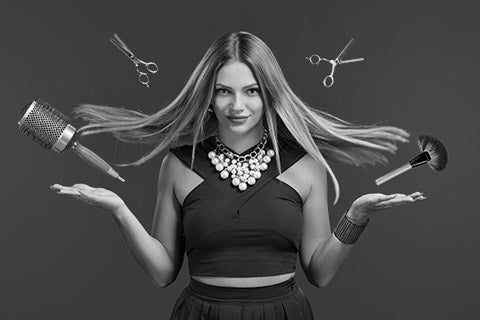Hair Mask vs. Hair Conditioner: Understanding the Difference
Posted on April 10 2024
In the world of hair care, navigating through the myriad of products can be overwhelming, especially when it comes to understanding the distinctions between hair masks and hair conditioners. While both serve the purpose of nourishing and improving the condition of your hair, they each have unique formulations and benefits tailored to specific hair care needs. In this comprehensive guide, we'll delve deeper into the differences between hair masks and hair conditioners, helping you make informed decisions about which product is best suited for your hair.
Hair Conditioner: The Daily Hydrator
Hair conditioner is a staple in most hair care routines, serving as a daily hydrator and detangler. Typically used after shampooing, conditioners are formulated to replenish moisture lost during cleansing, leaving hair soft, smooth, and more manageable. The primary function of a conditioner is to coat the hair shaft, sealing in moisture and smoothing the cuticle to reduce frizz and breakage.
Conditioners contain a variety of ingredients, including silicones, oils, and humectants, which work together to hydrate and nourish the hair. Silicones provide a protective barrier that helps prevent moisture loss and enhances shine, while oils such as argan, coconut, or jojoba oil, penetrate the hair shaft to provide deep conditioning and nourishment. Humectants like glycerin or hyaluronic acid attract moisture from the air, helping to keep the hair hydrated throughout the day.
Regular use of a conditioner can improve the overall health and appearance of your hair, making it softer, more manageable, and less prone to damage. It's recommended to apply conditioner to the lengths and ends of the hair, avoiding the scalp to prevent weighing down the hair or causing buildup.
Hair Mask: The Intensive Treatment
Hair masks, also known as deep conditioners or treatments, are intensive treatments designed to provide deep nourishment and repair to the hair. Unlike regular conditioners, which focus on providing instant hydration and manageability, hair masks contain higher concentrations of conditioning agents, as well as additional ingredients such as proteins, vitamins, and botanical extracts, which penetrate deeper into the hair shaft to strengthen and revitalize from within.
Hair masks are particularly beneficial for those with dry, damaged, or over-processed hair, as they can help restore moisture, repair damage, and improve elasticity. They're often used as a weekly or bi-weekly treatment, depending on the hair's condition and needs.
To use a hair mask, apply a generous amount to clean, damp hair, focusing on the mid-lengths and ends where hair is most prone to dryness and damage. Leave the mask on for the specified amount of time, allowing the ingredients to penetrate deeply into the hair shaft. For an extra nourishing treatment, you can cover your hair with a shower cap and apply heat using a hair dryer or hot towel to help open the cuticle and enhance absorption.
After rinsing out the mask, you'll notice your hair feels softer, smoother, and more manageable, with improved shine and hydration.
Choosing the Right Product for You
When deciding between a hair mask and a conditioner, it's essential to consider the current condition of your hair, your hair type, and your specific needs. If your hair is relatively healthy and just needs a daily dose of moisture and softness, a regular conditioner may suffice. However, if you're dealing with dryness, damage, or frizz, incorporating a weekly hair mask into your routine can provide that extra boost of hydration and repair.
Additionally, it's crucial to choose products formulated for your hair type and texture. Fine or oily hair may benefit from lightweight, rinse-out conditioners, while thicker or drier hair types may require more intensive, leave-in treatments.
Ultimately, both hair masks and conditioners play essential roles in maintaining the health and appearance of your hair. By understanding the differences between the two and selecting the right product for your hair care needs, you can ensure that your locks stay nourished, hydrated, and looking their best, day after day.

